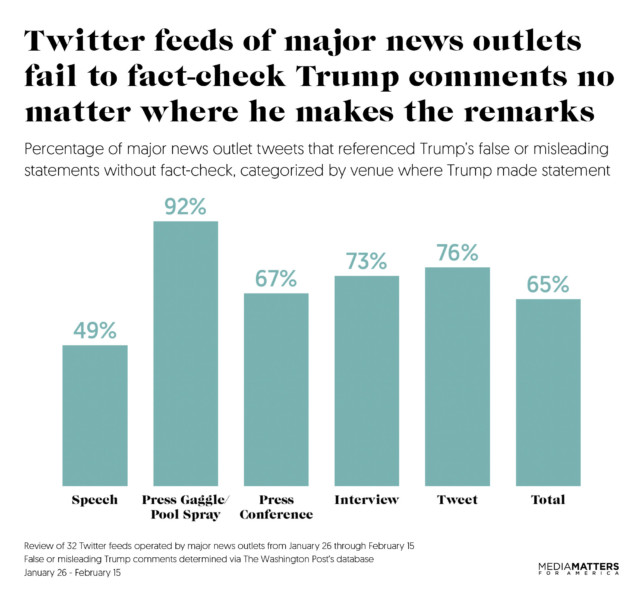Sign up for The Media Today, CJR’s daily newsletter.
When a president speaks, what he says is, by journalistic norms, inherently newsworthy. But when a president lies—on social media, at press conferences, and in speeches—news organizations have to reconsider old rules that instruct us to print (or tweet, or air) everything that he says. A new study from Media Matters for America found what many have long suspected anecdotally: news outlets too often fail to debunk Donald Trump’s false statements in the body of tweets about press conferences, speeches, or press gaggles headlined by the president.
Media Matters found that, in a three-week period, news outlets tweeted false or misleading statements by Trump without clearly correcting them in the body of the tweet 65 percent of the time. Authored by Matt Gertz and Rob Savillo, the study examined more than 2,000 tweets posted between January 26 and February 15 from the Twitter accounts of major American print, online, and broadcast news outlets.
RELATED: Do journalists pay too much attention to Twitter?
“There is a lot of discussion of how journalists are passing on the president’s misinformation in headlines and tweets and we wanted to put some data to the phenomenon,” says Gertz, a senior fellow at Media Matters. “I was not expecting to have results that were as extreme as what we got.”
The authors chose Twitter accounts run by 32 major American news outlets and wires, including The New York Times, the Los Angeles Times, NBC, ABC, CBS, Axios, Politico, the Associated Press, Reuters, USA Today, and others. They focus specifically on tweets that referred to comments made by Trump.
“We went through all of the tweets and compared the comments they highlighted to The Washington Post’s database,” Gertz tells CJR. “If the database said the comment was false or misleading, we then looked at the tweet holistically and if there was any indication whatsoever [that the outlet had attempted to fact-check the claim], we were inclined to say this is the outlet disputing it.”

Courtesy of Media Matters for America
Thirty percent of the tweets sent during that time period referred to false or misleading statements made by Trump, as defined by The Washington Post’s ongoing database. Nearly two-thirds of the time—an average of 19 times per day—the Twitter accounts managed by the selected news outlets did not label the statements as false in the body of the tweet.
This is a problem, the authors write, because of research that says headlines embedded in social media posts are often as far as readers get, resulting in the passive spread of misinformation on the part of new organizations.
“We have been covering this phenomenon for more than a decade,” Gertz says. “I think the general way journalists construct articles doesn’t work given what we know about how people process information. The Trump phenomenon has made this a more pressing concern because it’s so clear that Trump says things that aren’t true over and over, yet journalists have not incorporated that into their general practice.”
The study further examined the settings in which news outlets were most likely to tweet false statements made by Trump without marking them as such. Ninety-two percent of the tweets that repeated Trump claims without disputing them were posted after press gaggles and pool sprays. During formal speeches given by the president, the news outlets performed better, leaving claims undisputed just 49 percent of the time. One notable exception was this year’s State of The Union address. In the 24 hours after the speech, outlets disputed 53 percent of false claims made by Trump that they tweeted about compared to 27 percent throughout the rest of the study; February 4, the day before the speech, and February 5, the day of the speech, were the only days in the three week period in which the number of tweets disputing false claims made by Trump exceeded those that did not.
In an earlier study published in March, Gertz and Savillo praised outlets like the Times, NPR, the Post, the Los Angeles Times, and Politico for their use of graphics on Twitter that clearly debunked claims Trump made during the speech, in real time. Gertz attributes the difference in performance to the prominence of the event and benefits like embargoed copies of the speech that help outlets prepare ahead of time.
Some of the same outlets that did well during the State of The Union address, the authors say in their new report, failed to use the same successful fact checking methods consistently.
“The New York Times’s main Twitter feed and politics feed disputed every misleading Trump comment they tweeted about during the 24 hours following the State of the Union,” Gertz and Savillo write, “but they did so only 38 percent of the time over the rest of the period.” Politico disputed more than four of every five misleading Trump claims they tweeted about during the State of the Union, but did so a measly 8 percent of the time otherwise.
Some news outlets performed markedly better–and worse–than others. The Hill, which has 3.25 million Twitter followers, was responsible for more than 40 percent of the tweets that failed to fact-check false statements made by Trump in its tweets. Gertz says the numbers are so high because part of their social media strategy, it seems, includes publishing the same tweets in regular intervals. The outlet also tweeted about Trump at higher rates than the others. The Hill disputes Media Matters’s characterization, saying it is “a non-partisan media outlet that reports on many things, including reporting accurately what newsmakers say.”
Four Twitter accounts managed by ABC News neglected to dispute claims in tweets 71 percent of the time. CBS’s accounts (three were included) “performed poorly, passing along the president’s falsehoods without disputing them 87 percent of the time” according to the report.
On the other end of the spectrum, NPR’s main Twitter account published just 20 tweets about Trump comments in the entire three week period. Four of the tweets referenced false claims made by Trump, and the outlet disputed them 100 percent of the time.
NBC’s Meet the Press account rarely tweeted about Trump comments–just 9 percent of their tweets about the president referred to comments he had made. (They failed to dispute the false claims 83 percent of the time, however.) The Post’s main account tweeted about false or misleading Trump comments a total of 37 times and disputed the misinformation 33 times. Fox News did not tweet at all in the three weeks during which the study was conducted.
How can outlets improve their coverage? “One facet would be to slow down and take your time. A lot of mistakes are happening with various outlets tweeting clips from the president’s various appearances in real time and I’m not sure what the rush is,” says Gertz. “It shouldn’t be the practice of the news media to help the president mislead the public.”
RELATED: Which one of these three types of journalists are you?
Has America ever needed a media defender more than now? Help us by joining CJR today.



